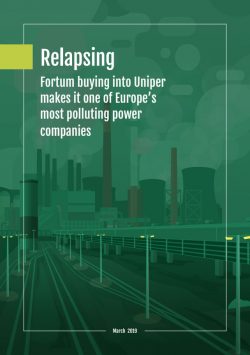26 March 2019
Fortum AGM: Uniper investment makes Finnish state-controlled utility a top ten polluter in Europe
HELSINKI 26 March 2019 – Finland’s state-owned Fortum is now responsible for hundreds of premature deaths and other potent health impacts from coal across Europe, thanks to its increasing investments in German energy company Uniper, according to new modelling from Europe Beyond Coal and Greenpeace Nordic.
 Produced with state-of-the-art atmospheric modelling of pollution and the most recently available data, this research estimates that Fortum’s plants and its 49.9 percent stake in Uniper means it is taking on responsibility for 320 premature deaths, 130 new cases of chronic bronchitis, and 5,400 asthma symptom days in children – based on calculations for 2016.
Produced with state-of-the-art atmospheric modelling of pollution and the most recently available data, this research estimates that Fortum’s plants and its 49.9 percent stake in Uniper means it is taking on responsibility for 320 premature deaths, 130 new cases of chronic bronchitis, and 5,400 asthma symptom days in children – based on calculations for 2016.
The health impact of the pollution from Fortum’s and Uniper’s plants combined translates to a modelled 5,400 hospital admissions and 230 lost working days, for a total of EUR340 million in health costs annually. While Fortum did not have a stake in Uniper in 2016, this data highlights the health responsibility Fortum has taken on with its investment in Uniper.
“Coal-fired power plants shorten the lives of Europeans by emitting vast quantities of toxic sulfur, nitrogen and particle pollution. Fortum is now responsible for hundreds of premature deaths and total health impacts in the hundreds of millions of Euros through its increasingly large stake in Uniper. This makes it one of Europe’s ten most polluting power companies. To protect our health and climate, Fortum has a responsibility to phase out these dirty power plants,” said Lauri Myllyvirta, lead author of the study and senior analyst with Greenpeace’s Global Air Pollution Unit.
“Fortum has a relatively progressive company strategy, but its investment in Uniper puts it at great risk of relapsing into being an irresponsible polluter. As Uniper’s single largest shareholder, Fortum has an opportunity to do the right thing, to live up to its responsibilities, and press for a coal phase out that respects the Paris Agreement. This means planning for the closure – not sale – of all coal plants it is associated with by 2030 or earlier,” said Kaarina Kolle, Coal Finance and Utility Coordinator with Europe Beyond Coal.
Contacts:
Greg McNevin, Communications Director, Europe Beyond Coal (English)
[email protected], +49 1605 247 857
Lauri Myllyvirta, lead author of the study and senior analyst with Greenpeace’s Global Air Pollution Unit
[email protected], +358 50 3625 981 (Finnish, English)
Kaarina Kolle, lead author of the study and coal finance and utility coordinator, Europe Beyond Coal
[email protected], +32 4 83 26 20 75 (Finnish, English)
About:
Europe Beyond Coal is an alliance of civil society groups working to catalyse the closures of coal mines and power plants, prevent the building of any new coal projects and hasten the just transition to clean, renewable energy and energy efficiency. Our groups are devoting their time, energy and resources to this independent campaign to make Europe coal free by 2030 or sooner. www.beyond-coal.eu
Notes:
1) The briefing, “Relapsing: Fortum buying into Uniper makes it one of Europe’s most polluting power companies” can be found here: https://bit.ly/2Fv4edJ.
2) The state-owned Finnish energy company Fortum is the greatest single owner of the German company Uniper. As from 30 June 2018, Fortum has consolidated Uniper as an associated company. Fortum currently owns 49.9 percent of Uniper.
3) The study puts forward recommendations for Fortum, the Finnish government and the financial institutions associated with Fortum.
Fortum is demanded to:
– Publish a clearly articulated and detailed roadmap for the gradual closure (not sale) of existing coal plants of both companies, ending at the latest in 2030 – despite the phase-out date of 2038 set by the German Coal Commission.
– Not sell their coal plants but rather take responsibility for closing them, and closure dates should be announced to plan for a just transition.
– Force Uniper to put an immediate end to capital expenditure into Datteln 4 and any form of lifetime extension for existing coal plants. Datteln should not be allowed to operate – as has been recommended by the German Coal Commission.
The Finnish government is demanded to:
– Immediately update the Finnish Government’s Resolution on State-Ownership Policy to align business plans and practices with the goal of limiting global warming to 1.5DegC. (covering scopes 1-3) – with an explicit clause to discourage selling of high-carbon assets instead of closing them.
Fortum’s shareholders are demanded to:
– Robustly engage with Fortum and Uniper through their ownership of the company and ensure the companies genuinely contribute towards compliance with the Paris Climate Agreement aim of temperature rises not exceeding 1.5DegC.
